Is your dog chewing or licking his paws? Don’t be alarmed– paw-chewing behavior is a pretty common problem.
Paw chewing and licking don’t usually indicate a veterinary emergency, but it is something you’ll want to investigate and address. If nothing else, it indicates that your dog is pretty uncomfortable, and you’ll want to help your furry friend feel better as quickly as possible.
We’ll explain some of the most common reasons dogs chew their paws and share a few treatments below.
Help! My Dog Is Chewing His Paws: Key Takeaways
- Dogs may chew on their paws for a variety of reasons, including injuries, parasites, and infections. Additionally, some dogs may chew their paws for mental or emotional reasons, such as anxiety.
- You’ll want to contact your vet anytime your dog starts chewing his paws or licking his paws excessively. There are a few home remedies for itchy paws, but you must first ensure that your dog is not suffering from a more serious — potentially systemic — health problem.
- Some of the home remedies you can try include washing your dog’s paws after walks or using paw balm to soothe dry skin. However, things like bacterial or yeast infections will generally require your vet’s help to treat.
Why Do Dogs Lick or Chew on Their Paws?
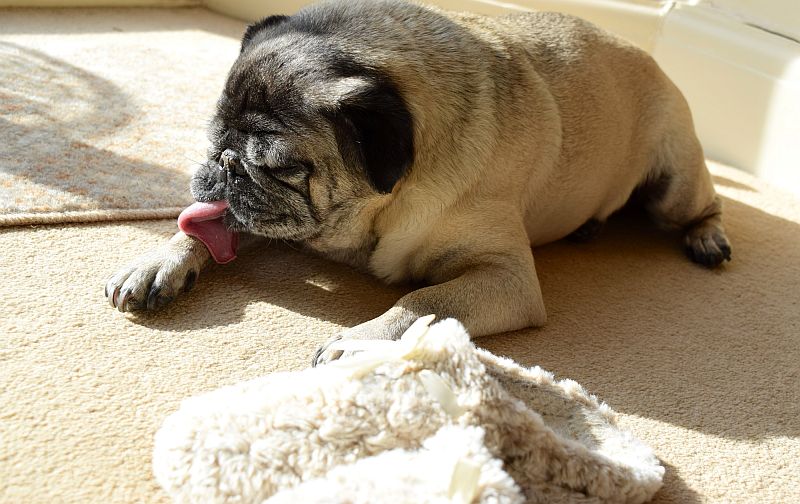
Seeing your dog incessantly chew or lick his paws can be distressing, especially if the behavior has sprung up out of nowhere.
In order to properly assist your furry friend, it’s important to get to the bottom of why your dog is chewing on his paws — this is the only way to provide your pet with effective relief.
Here are some of the most common reasons your pooch may be licking or chewing his paws lately:
- Injury — Dogs often lick their wounds, so you should always examine your pup’s paws for injuries anytime he starts licking or chewing his feet. Be sure to check for things like cuts, punctures, splinters, or irritation. Also, note whether or not your furry friend is struggling to put weight on the affected paw.
- Dry Skin — Dry skin can lead to itchy or irritated paws, which may make your four-footer start chewing or licking them. This is especially common when the air is especially cold and/or dry.
- Allergies — Year-round or seasonal allergies can provoke irritation and itchiness in your furry friend, leading him to lick or chew on his paws.
- Anxiety — Many pups will groom themselves when they are feeling nervous or lonely, so be sure to familiarize yourself with the signs and symptoms of dog stress and anxiety. Also, take note of when your dog tends to chew on his paws — if it usually happens in the same type of circumstances, you can start to piece together his triggers.
- Boredom — Some dogs chew out of pure boredom. If you’re finding that your furry friend starts chewing after spending a bit of time on his own, it may help to give your pooch some long-lasting chews or puzzle toys to bust your buddy’s boredom. Also, make sure your furry friend is getting plenty of exercise and play sessions throughout the day.
- Fleas and Other Parasites — Flea saliva often leads to itchy, irritated skin (some dogs even become allergic to flea saliva) that may cause your canine to chew on his paws. Other parasites, such as harvest mites, may also cause irritation and redness.
- Yeast Infection — Dogs with yeast infections of the paws will usually experience redness, itchiness and general irritation in the affected area. Yeast infections are more common among some breeds than others, including shih tzus, cocker spaniels, basset hounds, and German shepherds, among others.
- Contact Dermatitis — It’s possible that your dog is chewing in reaction to some irritant that came into contact with his paws. Yard chemicals, certain types of grass, and other common outdoor stimuli may have caused some temporary irritation.
- Pain — Dogs experiencing pain from arthritis or other conditions may attempt to lick their paws to alleviate their symptoms. Dogs might even chew their paws even if the pain isn’t localized in the paw area.
- Bacterial Infection — It’s not unheard of for the moisture on a pup’s paws to lead to a bacterial infection. Usually, affected dogs will experience redness around the paws and sometimes on the paw pads themselves. These infections are typically treated with prescribed canine antibiotics.
- Interdigital Cysts — These painful bumps, which are most common on the front paws, occur when a hair follicle becomes clogged. This leads to swelling and discomfort which can cause your dog to chew on his toes. However, it is important to note that the reverse is also true – repeated paw chewing can lead to the development of interdigital cysts.
- Hyperkeratosis — This is a condition in which excess keratin is produced, thereby leading to the thickening of a dog’s toe pads (or nose skin, in other cases). This in turn, can cause the pads to become very dry and crack. Hyperkeratosis can occur in any dog, but it is most common in older four-footers.
- Salt Irritation — Dogs living in cold climates may develop paw irritation from walking on salty, gritty roads during the winter. This irritation may cause your dog to start chewing on his paws (which may exacerbate the problem), so consider fitting your pet with some dog booties to protect his paws.
- Burns – Flipping the script, hot weather can also lead to paw problems. For example, dogs may burn their paw pads by walking on hot pavement or asphalt. Once again, booties can help prevent these kinds of problems.
- Self-Injury – Unfortunately, some dogs can get trapped in a vicious cycle, which starts when they suffer a minor wound (such as a splinter in the paw). This leads to lots of licking and chewing, which can sometimes cause further irritation. This additional irritation causes the canine to lick more frequently, which – you guessed it – worsens the irritation.
Megan (K9 of Mine Founder) here! Below is a photograph of my dog Remy’s paw when he was diagnosed with a bacterial infection. Looks pretty scary, doesn’t it?
Upon noticing this giant red bulge (which almost looked like an additional paw toe), I took Remy to the vet and he was promptly put on antibiotics. After two weeks it cleared up and he was back to normal!
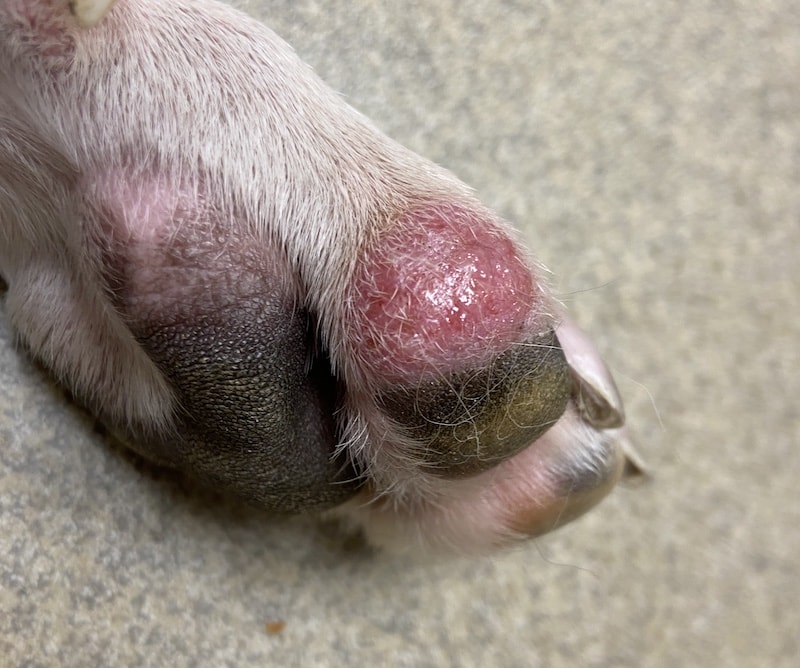
Although you may be able to diagnose a few of the problems discussed above on your own, it is still important to visit your vet.
Not only is it possible for dogs to suffer multiple, simultaneous problems that cause itchy paws but you’ll also need your vet’s help to treat many paw problems, such as bacterial infections.
What Should You Do If Your Dog Is Chewing His Paws?
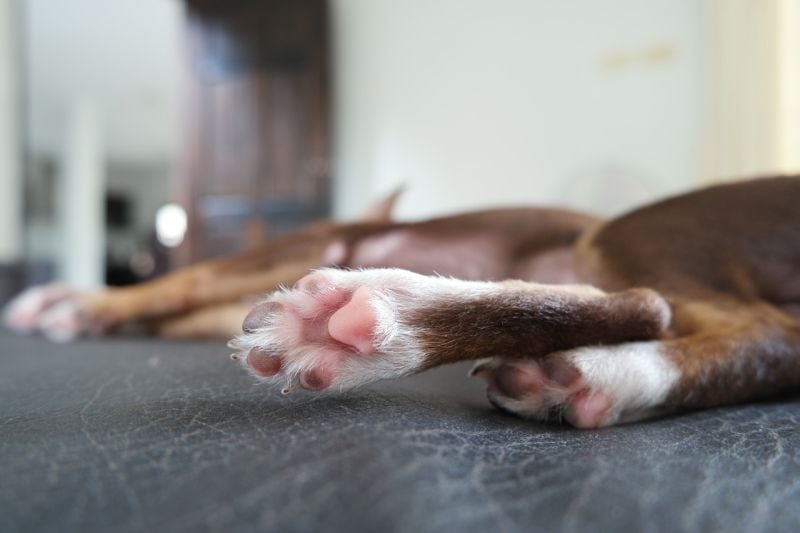
As soon as you notice that your dog is chewing his paws fairly regularly, it’s time to do a thorough physical examination. You’ll want to take note of any the following ailments on the paw pads, or in between your dog’s toes:
- Ticks, fleas or flea bites
- Redness or discoloration
- Punctures
- Burns
- Splinters
- Glass
- Swelling
- Bleeding
In addition to these visual cues, you’ll also want to determine whether or not your dog’s paws exhibit a particular odor. Also, as noted earlier, if your dog is struggling to put weight on the affected paw(s).
Using this information, you should be able to work with your veterinarian to determine the root cause of the issue and start the healing process.
If you aren’t seeing any of the symptoms listed above on your pooch’s paws, it’s a good idea to take these alternative factors into account. While these cues are less common, they can still help indicate why your furry friend is chewing his paws more often, so you’ll certainly want to share any notable changes with your vet.
- Itching in other parts of the body
- Changes in appetite
- Changes in shedding or hair loss
- Changes in regularly worn clothes that may irritate the skin
- Changes in pooch grooming products like shampoo and conditioner
How Do You Stop Your Dog from Licking His Paws?
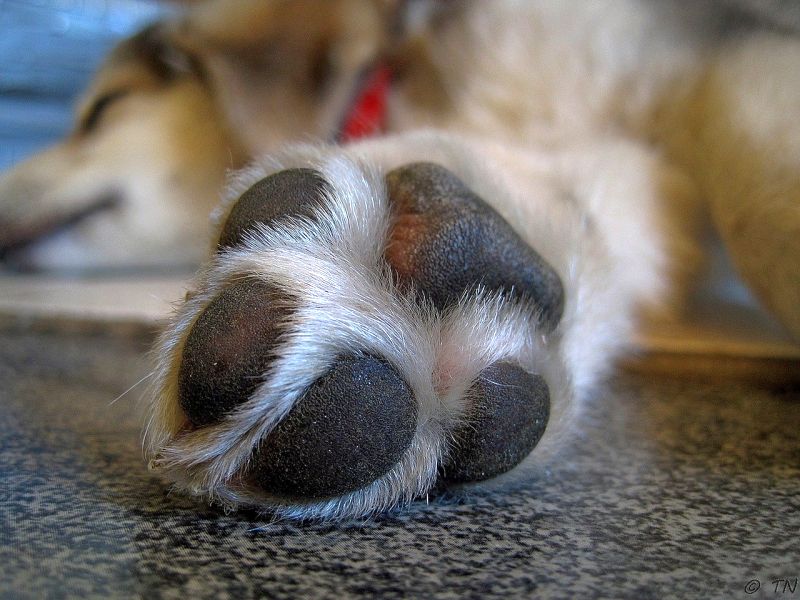
The only way to prevent your pooch from chewing his paws is to address the root cause of the issue. While you may be able to treat simple issues yourself, most of the causes of itchy, painful, or irritated paws will require your vet’s help. Plus, many things that’ll cause your dog’s paws to itch can be tricky to diagnose.
Nevertheless, here are a few simple things you can try to stop your dog from licking his paws:
- If you believe your dog’s paws are irritated due to environmental allergies, you can start using a dog paw washer after your pet returns inside to wash off any triggering substances.
- If injuries or abrasions are leading to the paw problem, you may want to fit your dog with booties before going outside.
- If you think your dog’s paws are irritated because they’re dry, you can try using a dog paw balm to protect his pads.
- If you suspect that fleas are the culprit, you can (and should) start using a good preventative canine flea treatment. In fact, some (but not all) flea treatments will also eliminate some other parasites, such as harvest mites.
Regardless of the cause of your dog’s itchy paws, get in the habit of notating your dog’s experience. Be sure to write down any signs of irritation, and even document the problem with pictures to track your pooch’s paw healing process. Try to notice certain triggers and behaviors that usually lead to your furry friend chewing his paws.
If you can’t find something obviously wrong with your pooch’s paw (as well as an effective solution), you’ll need to enlist your vet’s help. While occasional paw licking and chewing is fairly normal, you should seek out external help if you notice a change in the frequency of your dog’s habits.
***
Paw chewing and licking is fairly common for our canine companions. Just remember to examine your pooch properly under the guidance of your veterinarian to rule out any serious underlying issues.
Does your furry friend lick his paws? What has helped your dog in the past? We’d love to hear all about it in the comments below!
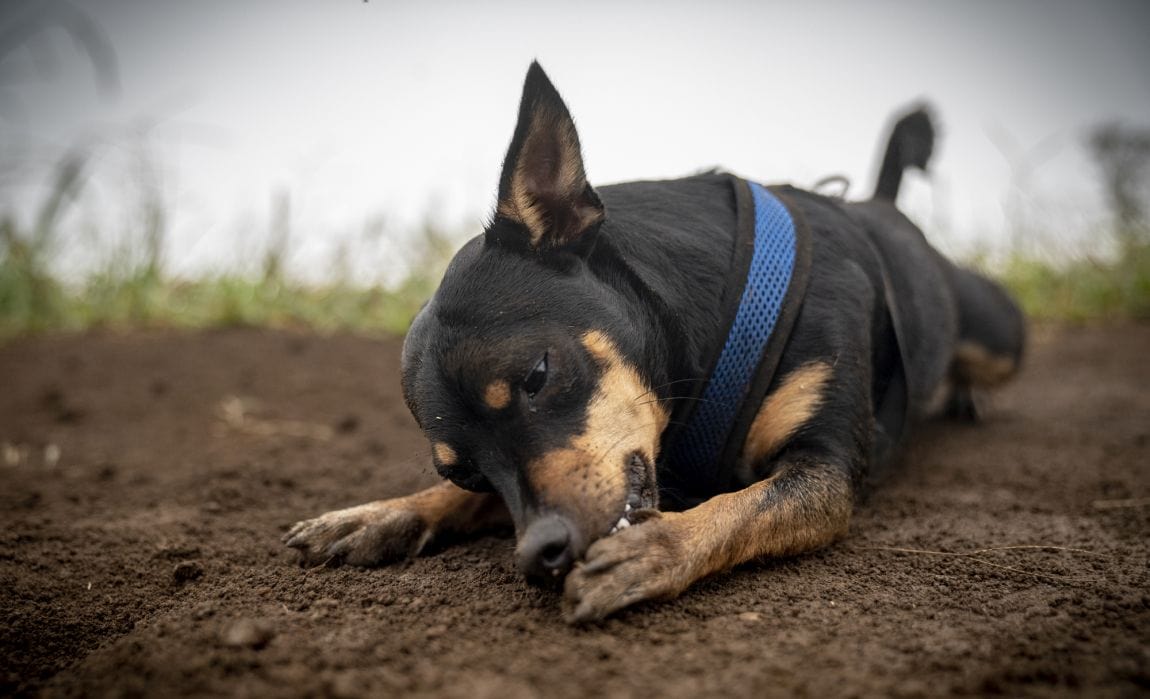





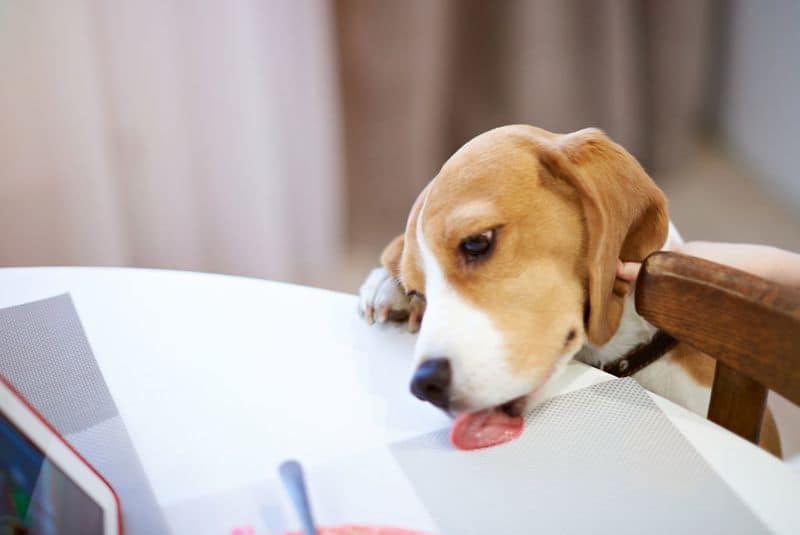
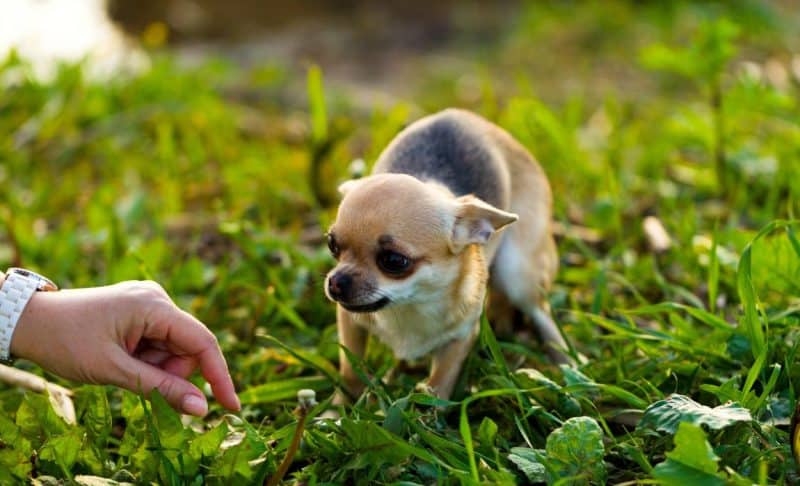
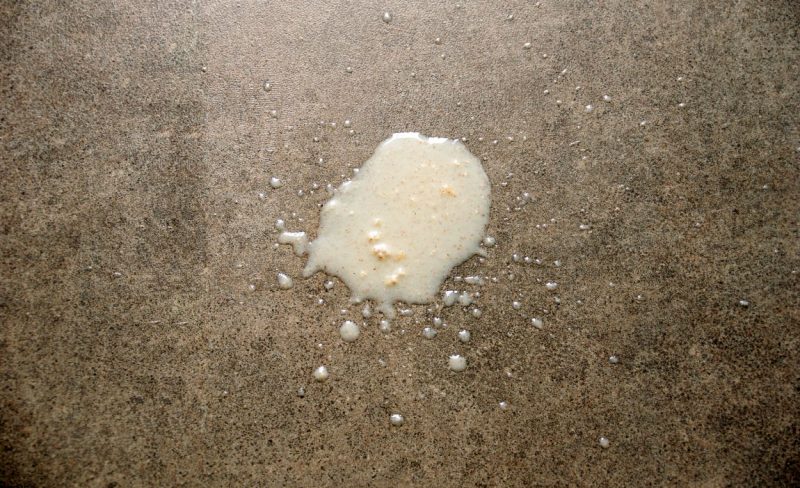
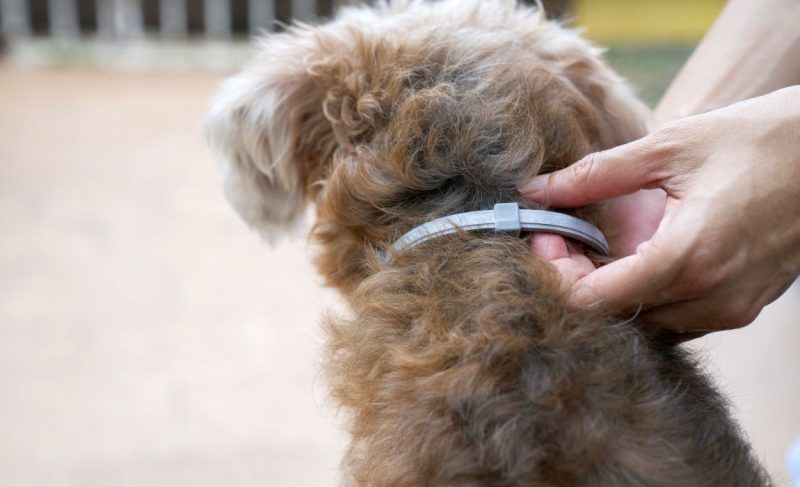
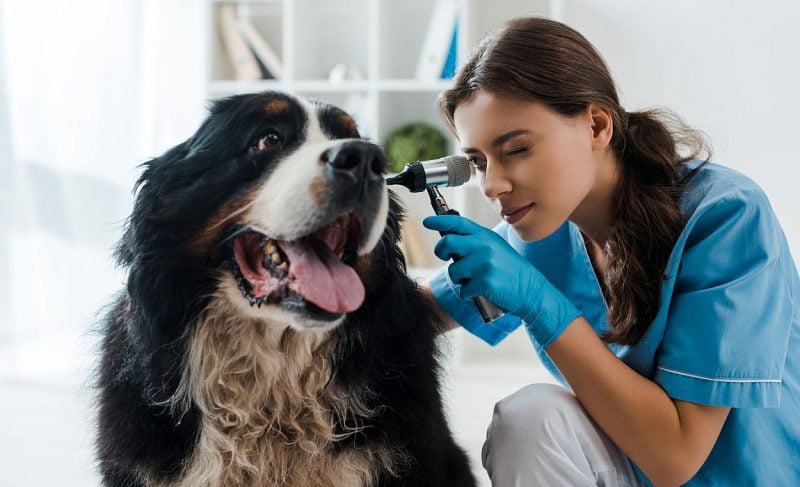
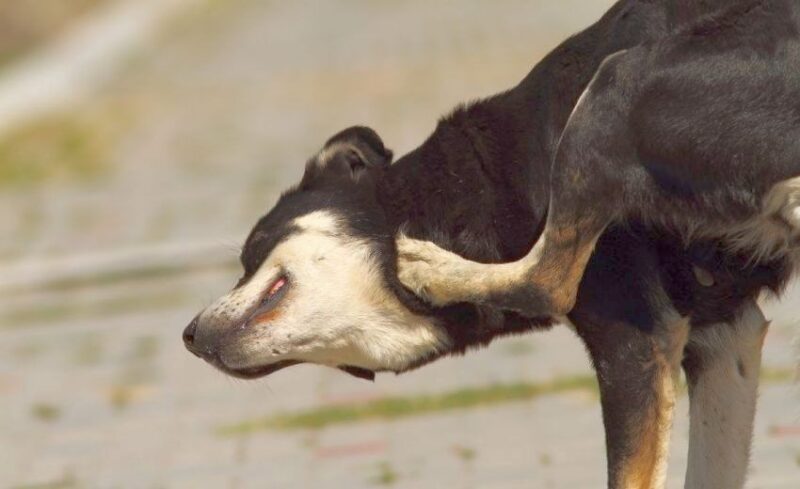
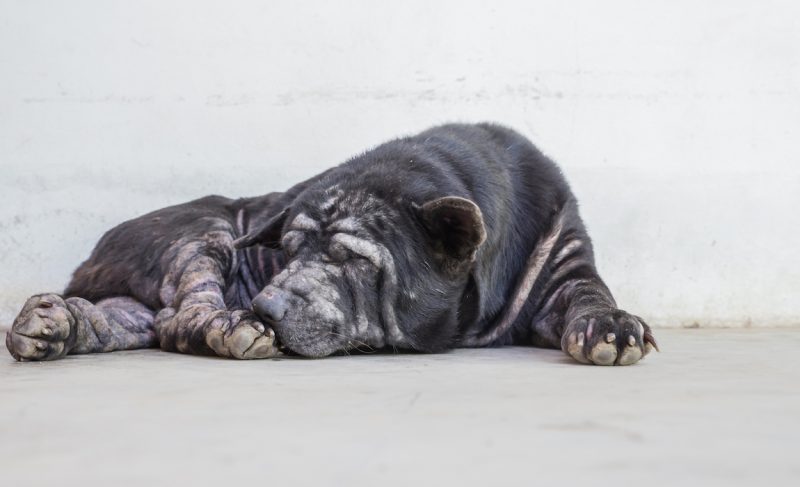

Leave a Comment